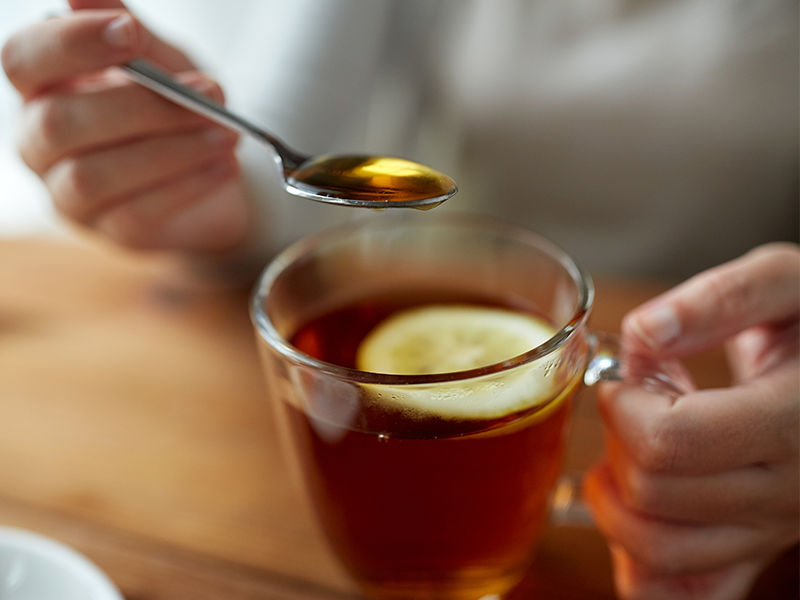Is honey a natural sugar or a free sugar?
Honey is a natural sugar, made by bees from flower nectar. It’s made through a simple process that needs minimal filtering or pasteurisation to remove impurities. It can even be eaten raw.
However, being natural, does not necessarily mean it’s healthy. Like refined sugar, honey is a free sugar, meaning it is not locked away inside the cells of food.
By contrast, the natural sugars found inside fruit and vegetables are found inside food cells and come with extra nutrients, such as fibre.
Eating too much free sugar can contribute to weight gain, and in turn an increased risk of heart disease and type 2 diabetes.
So, make sure you only eat free sugars, including honey, in moderation. Adults should aim to have no more 30g (around 7 teaspoons) of free sugar per day.
Calories and nutrition in a teaspoon of honey vs sugar
Is honey good for weight loss?
While honey varies slightly in nutritional content depending on the flowers used to make it, it’s primarily a source of sugar and calories with minimal additional nutrients such as fibre, protein, fat, vitamins, or minerals.
It is calorie-dense, with around 21 calories per teaspoon, meaning too much can contribute to you having an overall excess calorie intake, making weight loss difficult.
Want to get fit and healthy?
Sign up to our fortnightly Heart Matters newsletter to receive healthy recipes, new activity ideas, and expert tips for managing your health. Joining is free and takes 2 minutes.
I’d like to sign-up
Does honey have any health benefits?
As honey is minimally processed, it contains trace amounts of vitamins, minerals, and plant-based nutrients like antioxidants. This has led to claims that it supports heart health, digestion, immunity and memory.
However, there is no strong evidence or official health claims to back these claimed benefits of honey.
To get any potential health benefits, you'd need to have around 80g per day, which would also mean consuming a lot of free sugars. This would cancel out any potential benefits.
Does honey help coughing or a sore throat?
Honey is often used as a home remedy for coughs or sore throats, but there is little evidence that it treats the symptoms.
Some feel its thick texture helps coat the throat and mixing it with tea or lemon can bring some relief.
However, the real benefits likely come from the warmth of the drink and staying hydrated. That said, adding honey to a warm drink will not hurt and might even make you feel a little better when you’re feeling unwell.

Is manuka honey better for you?
Manuka honey comes from the nectar of the Manuka tree and is known for its high levels of methylglyoxal (MGO), a compound with antibacterial properties, which helps reduce bacterial growth and fight infection.
Studies show it can help heal ulcers and surgical wounds when applied to the skin.
However, when eaten, its antibacterial effects are not as strong because the digestive system breaks down the compounds responsible for its antimicrobial activity.
Like any honey, it should be eaten in moderation.
It’s also important to know that store-bought Manuka honey is not sterilised, so is not recommended for treating wounds. It may contain bacteria or impurities that could cause infections rather than help with healing.
Medical-grade honey dressings are specifically designed for wound care and should only be used when appropriate.
Can people with diabetes eat honey?
Honey has a lower glycaemic index (GI) of around 50, compared to sugar's GI of 80. This is because honey has more fructose, which is absorbed at a slower rate than glucose, meaning blood sugar levels will not spike as quickly.
However, this does not make honey a better choice for people with diabetes as it is still a source of glucose, which can cause spikes in blood sugar.
Some honey products also contain added sweeteners, like high-fructose corn syrup or glucose syrup, which increases their GI, making them less suitable for blood sugar control.
If you have diabetes, it's best to choose pure honey and consume it in moderation as part of a balanced diet.
The takeaway: is honey healthy?
Honey is often seen as a better alternative to refined sugars, but it’s still a free sugar with little nutritional value.
Eating too much can lead to the same health risks as other added sugars.
A small drizzle of honey can add flavour and sweetness, but naturally sweet foods like berries, bananas, carrots or sweet potatoes are a healthier choice. They provide vitamins, minerals, antioxidants, and fibre while satisfying a sweet craving.
Meet the expert

Tracy Parker is a registered dietitian and sports dietitian with over 20 years’ experience. Her work in the NHS focused on heart health nutrition. At the British Heart Foundation, she advises on nutrition, diet and heart health.
What to read next...


